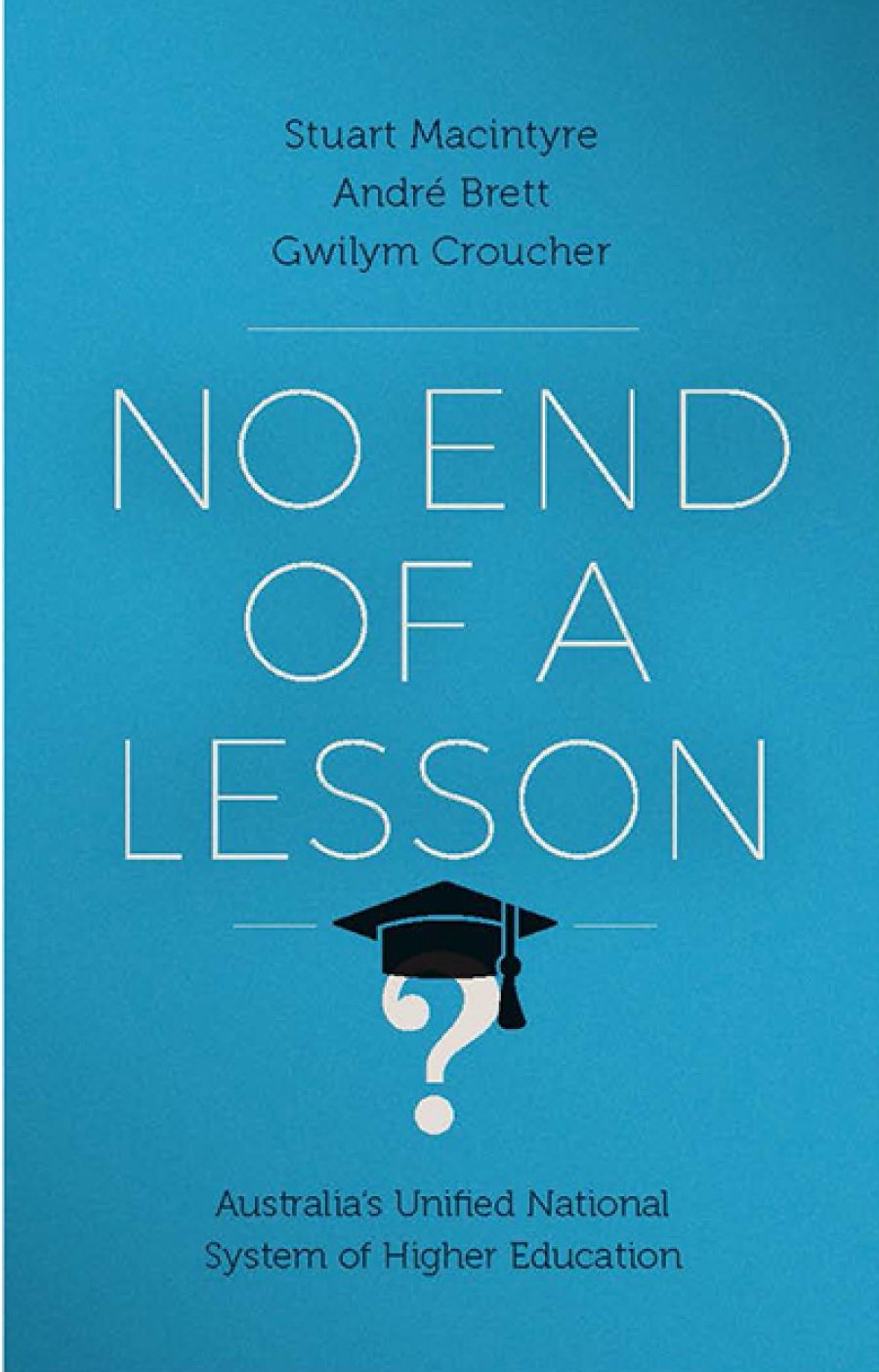
- Free Article: No
- Contents Category: Education
- Custom Article Title: Paul Giles reviews 'No End of a Lesson: Australia’s unified national system of higher education' by Stuart Macintyre, André Brett, and Gwilym Croucher
- Custom Highlight Text:
Ever since Henry VIII plundered the monasteries, relations between those in seats of power and learning have tended to be fraught, since political administrators do not take kindly to scholars thinking they know best how to run their own affairs, and vice versa ...
- Book 1 Title: No End of a Lesson
- Book 1 Subtitle: Australia’s unified national system of higher education
- Book 1 Biblio: Melbourne University Press, $49.99 pb, 332 pp, 9780522871906
No End of a Lesson provides a detailed historical account of how this process unfolded, with its microscopic attention to the minutiae of committee meetings and negotiations for mergers between smaller colleges occasionally testing the reader’s patience. But the aim here is to provide a scrupulously fair account of such protracted dealings, and in this the authors mostly succeed admirably. This book is itself the product of an Australian Research Council grant and might therefore be considered part of the system it is scrutinising, but from a broader perspective the challenge would have been to bring a degree of objectivity to bear on matters that are still, for most people, within living memory. Even though no explicit political case is argued here, it is clear enough from their style of dry humour that the authors are sceptical of figures such as John Button, Minister for Industry in the Hawke administration, who was disdainful of the ‘academic orientation’ of universities and wanted their culture to be geared more towards ‘the development of new products and services’. Two of these three authors (Stuart Macintyre and Gwilym Croucher) are associated with the University of Melbourne, and this also creates a perspectival ambiguity, since, although this work is meant to provide an overview of the national system – as opposed to other volumes in this series, which focus on individual universities – there is nevertheless a degree of slippage here, where the world view from Melbourne sometimes seems to blur into a universal value.
The authors consider what might have happened in 1988 if Melbourne and Sydney had decided to go independent rather than submitting to what Melbourne Vice-Chancellor David Pennington, a fierce critic of Dawkins, described as an imposition of ‘political interference and central regulatory control ... virtually unknown elsewhere in the Western world’. However, his counterpart at Sydney, John Ward, made the decision that such resistance would be counterproductive. Oxford and Cambridge have had similar discussions over recent years about the potential advantages and costs of positioning themselves outside a government-sponsored system, although they similarly came to the pragmatic conclusion that the risks associated with such a move would be too high. By contrast, the mixture of private and public academic institutions in the United States shows the benefits of not having one unified system as a sitting target for politicians. One wonders what would have happened to Ivy League colleges in the Trump era if they had been entirely state-funded, but the independence of such private establishments provides a model of autonomy and resilience that helps support the American system as a whole.
Macintyre, Brett, and Croucher offer a meticulous account of an important episode in the recent social and political history of Australia, marshalling a huge variety of sources in a way that will undoubtedly be helpful to scholars in future times. If the book itself lacks the stylistic brio of Stefan Collini’s Speaking of Universities (2017), which imagines in Swiftian terms senior lecturers in medieval history being drafted at the behest of government to the executive boards of declining corporations, it nevertheless provides a well-balanced if somewhat pessimistic view of the factors that have driven Australian higher education to its currently parlous situation. Dawkins himself declared in 2016 that the system he had devised was ‘completely out of date’, expressing surprise that it had lasted as long as thirty years and adding: ‘That is actually a bad thing.’ There is always going to be pressure on taxpayer resources, of course, particularly in an era when any government needs a much larger percentage of the population to go through higher education in order to sustain the information economy. But if there is one ‘lesson’ to be drawn from this book, it is that the gap between planning and outcome within academic environments is intractable, since discovery depends by definition on not knowing what you might (or might not) find. Ultimately, arguments between universities and government regulators turn not so much on money but on time management, with the surveillance beloved of administrators seeking to punch clocks, while the most creative aspects of university life unfold according to a more unpredictable schedule.


Comments powered by CComment